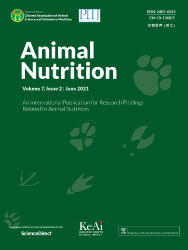Non-antibiotic feed additives in diets for pigs: A review
Yanhong Liu a, Charmaine D. Espinosa b, Jerubella J. Abelilla b, Gloria A. Casas b,c, L. Vanessa Lagos b, Su A. Lee b, Woong B. Kwon b, John K. Mathai b, Diego M.D.L. Navarro b, Neil W. Jaworski d, Hans H. Stein b, *
a Department of Animal Science, University of California, Davis, CA 95817, USA
b Department of Animal Sciences, University of Illinois, Urbana, IL 61801, USA
c Department of Animal Production, College of Animal and Veterinary Sciences, University of Colombia, Bogota 111321, Colombia
d Trouw Nutrition, Boxmeer, 5831 JN, The Netherlands
Anim Nutr. 2018 Jun;4(2):113-125. doi: 10.1016/j.aninu.2018.01.007. Epub 2018 Feb 8.
- Swine
- Open Access
- 2018

Abstract
A number of feed additives are marketed to assist in boosting the pigs' immune system, regulate gut microbiota, and reduce negative impacts of weaning and other environmental challenges. The most commonly used feed additives include acidifiers, zinc and copper, prebiotics, direct-fed microbials, yeast products, nucleotides, and plant extracts. Inclusion of pharmacological levels of zinc and copper, certain acidifiers, and several plant extracts have been reported to result in improved pig performance or improved immune function of pigs. It is also possible that use of prebiotics, direct-fed microbials, yeast, and nucleotides may have positive impacts on pig performance, but results have been less consistent and there is a need for more research in this area.
Keywords: Acidifiers; Direct-fed microbials; Minerals; Pigs; Plant extracts; Prebiotics.